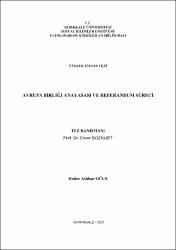Avrupa Birliği anayasası ve referandum süreci
Özet
Kendine özgü yapısı ve işleyişi ile gerek ulusal gerekse uluslarüstü alandaetki ve denetime sahip olan AB, günümüzde önemli bir dönüm noktasındabulunmaktadır. Başlangıçta altı devletle yola çıkan Birlik, genişleme süreçlerininartan etkisiyle gelecekteki konumunu yeniden yapılandırmak bir anlamda revizyonagitmek durumunda kalmıştır. Bu amaç doğrultusunda oluşturulmaya çalışılan AvrupaAnayasası şayet yürürlüğe girebilirse, Birliğin oluşturan kurucutemelinianlaşmaların ve bugüne kadar onları değiştiren ek tüm anlaşmaların yerini alacaktır.Avrupa yapılanması içinde demokrasi, saydamlık ve etkinliğin sağlanarak, Birliğinhukuki araçlarının basitleştirilmesi ve Temel Haklar Şartı'na işlerlik kazandırılmasınıtemel alan Anayasal Anlaşma'nın geçerliliği, her bir üye devletin iradesindenkaynaklanmaktadır. Yani taslağın yürürlüğe girebilmesi için her üye devletin kendibelirlediği prosedürler (referandum ve/veya parlamento onayı) çerçevesindeanayasayı onaylaması gerekmektedir. Ancak Birliğin kurucu iki üyesi olan Fransa veHollanda da anayasanın reddedilmesi ile AB'nin siyasi entegrasyonu büyük bir darbealmış ve belgenin geleceği belirsizliğe gömülmüştür. Bu ülkelerde yapılanreferandumlarda halk, aslında yalnızca Anayasa'yı değil, aynı zamanda Birliğin vekendi hükümetlerinin politikalarını da değerlendirmiştir. Genişleme süreciyle birlikteortaya çıkan sorunlar ve derinleşme yönünde atılan adımlarla, niteliği ve hedeflerifarklılaşan AB'nin gelecekteki varlığı konusundaki endişeler, Avrupa vatandaşlarınıntepkisini yüksek sesle ortaya koymalarına neden olmuştur. Bu bağlamda Birliğinsiyasi entegrasyonunu güçlendirmek isteyen liderler, yapılan zirve toplantılarındaaldıkları kararlar doğrultusunda anayasanın 2008 yılı sonuna kadar çözümekavuşturulması gerektiğini vurgulamışlardır. Her ne kadar anayasa reddedilse demevcut sistem (Nice Anlaşması) faaliyet göstermeye devam edecektir. Bu bağlamdaAnayasanın reddedilmesi AB'nin mevcut kurumlarını ne değiştirir ne de geçersizkılar. Ancak şu da bir gerçektir ki, Anayasa'nın reddi ile Avrupa projesi büyük birdarbe almıştır ve ne şekilde düzeleceği de tam olarak kestirilememektedir.Anahtar SözcüklerAnayasa, Referandum, Genişleme, Entegrasyon, Konvansiyon European Union, which has an influence and supervision in national andinternational fields with its unique structure and procedure, is at an important turningpoint. The Union, which set off with six states in the begining, had to go through akind of revision to reconstruct its future position, due to the overwhelming effects ofthe ?boarding? processes. If the Constitution, which was created with an intention tofufill this aim, can go into effect, will take over the fundamental foundingagreements and all the additional agreements which altered them. The validity of theConstitution Agreement which has a basis to provide democracy, transparency andefficiency among Europe, to simplify the jurisdical instruments of the Union and toprovide functionality to the ? Charter of Fundamental Rights? is constructed uponeach member state?s will. Namely, for the draft to go into effect, each member statehas to approve it through its own procedure (referandum and/or parliamenterianvote). Nevertheless, with France and Holland?s, the two founder states of the Union,refusal of the constitution, the political integration of the European Union had a greatimpact and the future of the document is now buried in ambiguity . Through thereferendum, people in these countries evaluated not only the constitution but also thepolicy of their own government and the Union. The concerns about the future of theUnion, whose attributes and objectives differentiated due to the problems in theboarding process and the steps taken towards deepening, caused the European peopleto speak up their reactions. Therefore, aiming to enpower the political integration ofthe Union, through a number of summits they held, the leaders have stressed that theConstitution is required to reach a solution by the end of 2008. Although theConstitution is disapproved, the current sytem (the Treaty of Nice) will continue tofunction. In this aspect, the disapproval of the Constitution neither changes norvalidates the current institutions of the EU. Neverthless, it is a fact that the Europeanproject has received a great impact with the disapproval of the Constitution and it isnot possible to determine how to reach a reconciliation.Key WordsConstitution, Referendum, Enlargement, Integration, European Convention.
















